Key takeaways:
- Cultural differences significantly influence networking practices, with Japan valuing formal introductions and Brazil favoring personal connections.
- Understanding and respecting local customs enhances networking experiences and avoids misunderstandings, as seen in the importance of silence in Japan and storytelling in Mexico.
- Active listening and adaptability are crucial for effective communication across cultures, transforming potential barriers into opportunities for deeper engagement.
- Building genuine relationships often takes precedence over formal business discussions, highlighting the importance of patience and authenticity in networking.
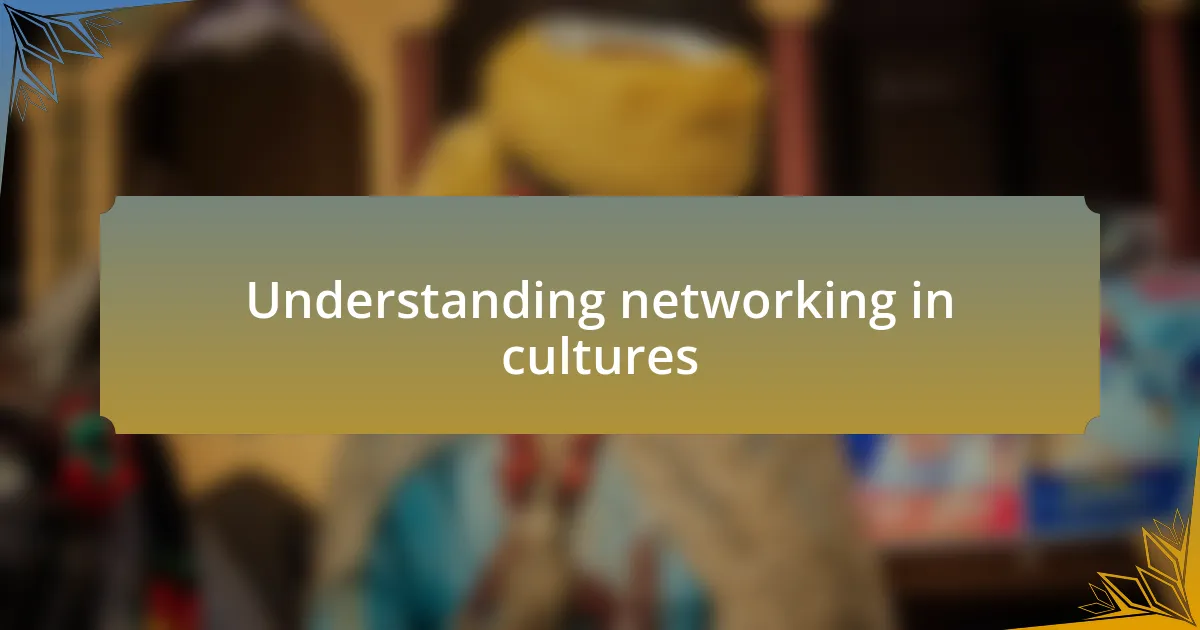
Understanding networking in cultures
Networking is a nuanced practice that varies significantly across cultures. For instance, during my visit to Japan, I was struck by the emphasis they place on formal introductions and bowing as a sign of respect. It made me reflect: how often do we overlook these subtle gestures in our own networking practices?
In contrast, my experiences in Brazil revealed a more relaxed approach, where personal connections take precedence over formalities. I found myself engaging in lively conversations filled with laughter, which was refreshing. This raised the question in my mind—does fostering genuine relationships provide a more solid networking foundation than adhering strictly to professional protocols?
One memorable instance occurred while networking at an event in Germany. I was puzzled by the upfront nature of discussions, where people were candid about their goals and expectations. It made me appreciate the directness that facilitates deeper connections in that culture, prompting me to consider how transparency can transform networking experiences elsewhere as well.
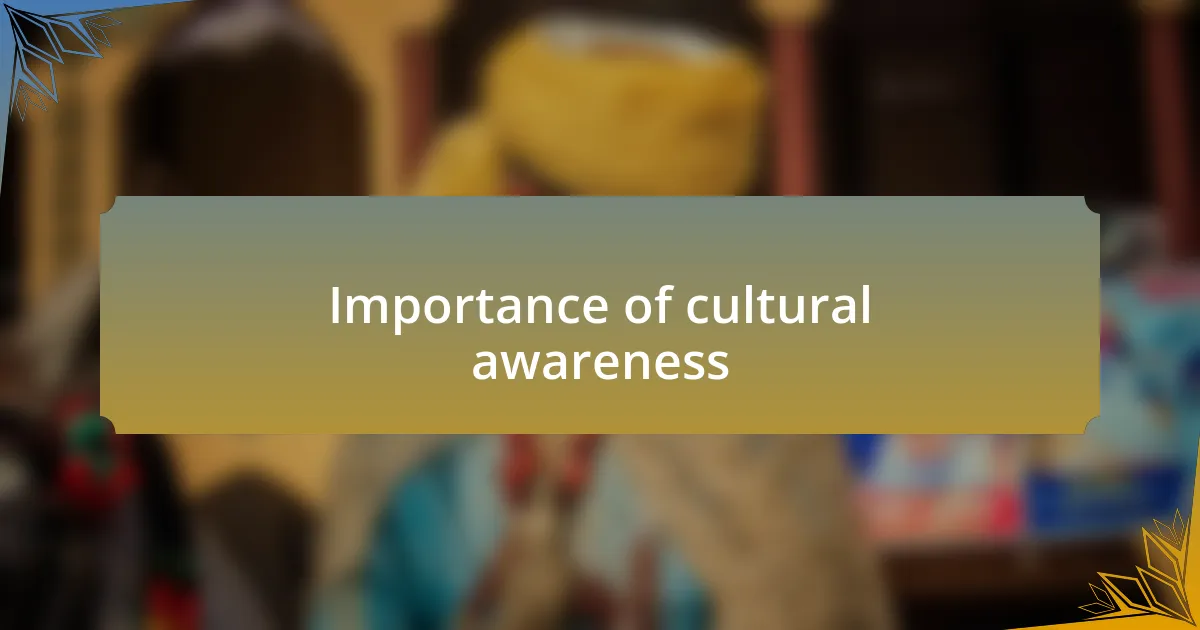
Importance of cultural awareness
Cultural awareness in networking opens doors to deeper connections and mutual understanding. I remember attending a business conference in India, where the importance of personal relationships is paramount. The locals took time to share stories and build rapport before diving into business discussions, which made me realize: how often do we rush these vital connections in our own networks?
Understanding cultural nuances also helps avoid misunderstandings. On one occasion, while networking in the Middle East, I was struck by how certain topics were considered taboo. I learned the hard way that what might seem innocuous in one culture could be offensive in another. That experience left me thinking—are we equipped to navigate such delicate waters in our cross-cultural interactions?
Finally, being culturally aware enhances your adaptability and responsiveness in diverse environments. I was once part of a networking event in Canada, where the relaxed yet respectful approach allowed for open dialogue. Seeing how everyone was encouraged to contribute regardless of status inspired me to reflect on how inclusivity fosters a richer networking experience. Isn’t it fascinating how cultural awareness not only shapes interactions but also enriches our professional lives?
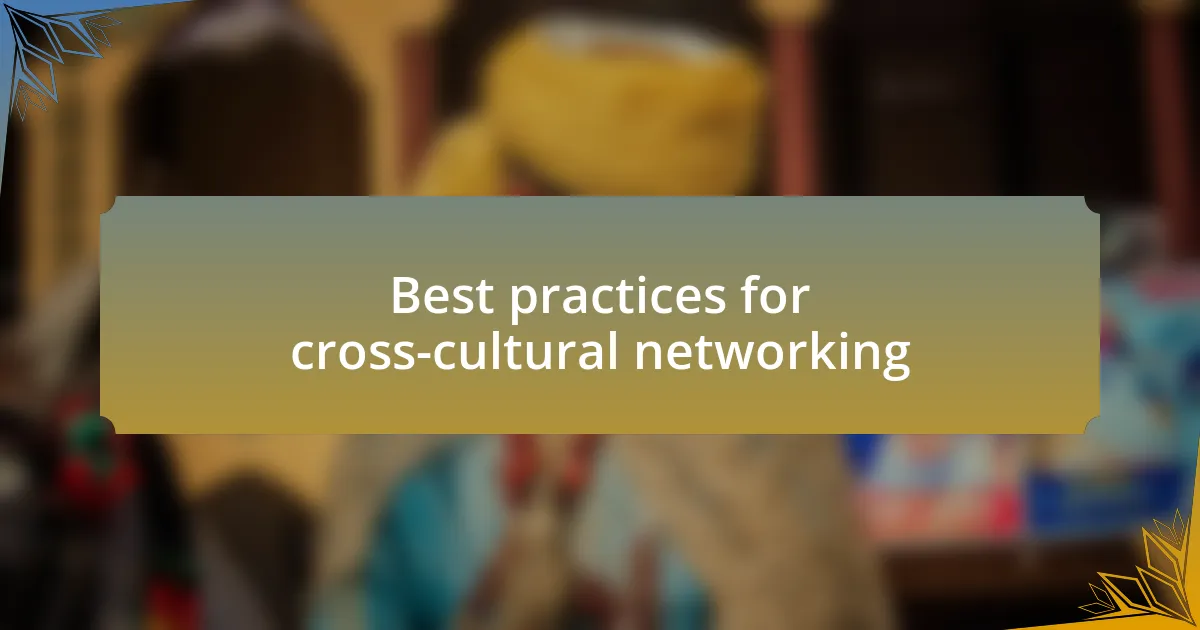
Best practices for cross-cultural networking
Building genuine relationships in cross-cultural networking takes time and patience. During a networking event in Japan, I experienced firsthand the value of silence. The Japanese often pause before responding, allowing for thoughtful answers rather than rushed exchanges. This taught me to appreciate the power of silence—how it can lead to deeper reflections and more meaningful conversations. I often wonder if we, in more fast-paced cultures, miss out on this depth.
Another key practice is to do your homework on local customs and etiquette. On a trip to Brazil, I learned that a friendly handshake holds significant importance. During my first meeting, I mistakenly offered a casual wave instead, which led to a bit of confusion. After that experience, I realized that respecting local customs not only helps avoid awkwardness but also shows genuine interest in building relationships. Have you ever stopped to think about the small actions that can have such a big impact on forming connections?
Embracing openness and flexibility can make all the difference in cross-cultural interactions. At a conference in Europe, I found myself in a roundtable discussion that veered off the agenda. While some participants struggled with the lack of structure, I saw an opportunity. By engaging in this organic conversation, I not only gained valuable insights but also fostered stronger connections with individuals who appreciated the authenticity of the moment. Isn’t it interesting how sometimes stepping outside the expected can lead to the best networking experiences?
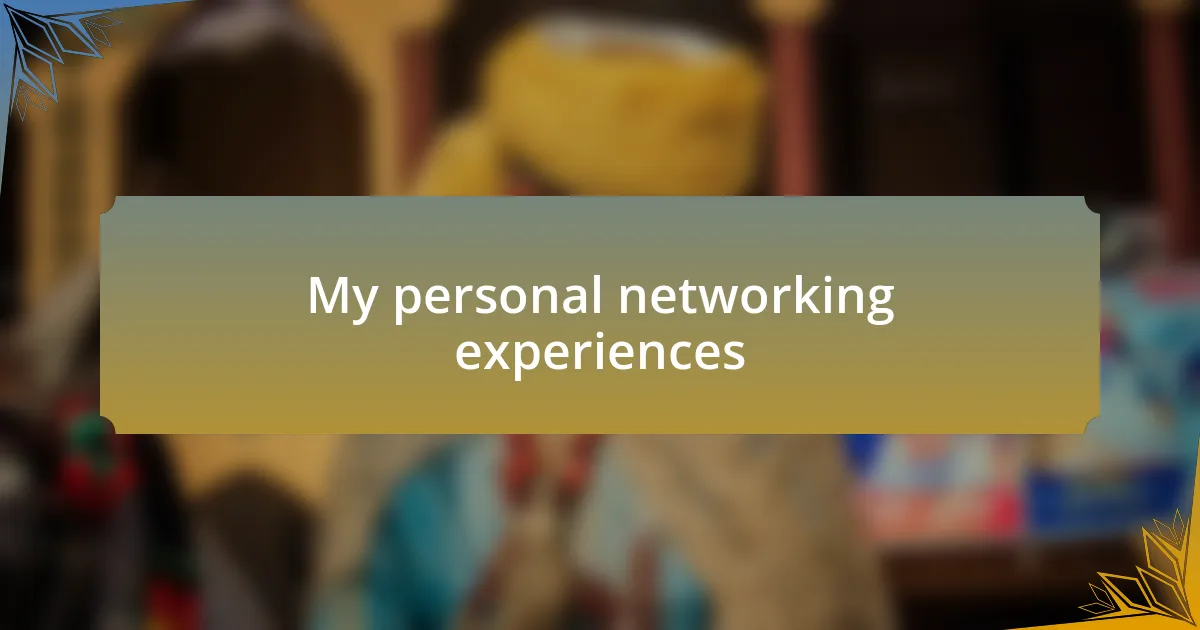
My personal networking experiences
Networking has often felt like navigating a maze for me, especially during my time in India. I attended a vibrant local festival that doubled as a networking opportunity. The warmth of the people amazed me, and as I connected with individuals over shared interests, I realized that authenticity is essential. Have you ever felt that instant connection with someone, as if you were simply meant to meet? It’s moments like these that remind me of the power of embracing cultural backgrounds in creating lasting relationships.
In contrast, while networking in Germany, I encountered a more direct approach to communication that initially threw me off balance. I remember sitting in a well-structured meeting where everyone spoke their minds, often without pleasantries. At first, I felt a bit taken aback, but soon I learned to appreciate this straightforwardness. Could it be that this style fosters efficiency and clarity? Engaging openly with distinct communication styles truly expanded my perspective on relationship-building.
Reflecting on my experiences in different cultures, I recall attending a networking dinner in Mexico where storytelling took center stage. As each participant shared personal anecdotes, laughter filled the room, and barriers melted away. This taught me that sometimes, sharing your journey—even the vulnerable bits—can create an immediate bond. Have you ever shared a story that unexpectedly resonated with someone? It’s in these shared narratives that I’ve found the foundation for unforgettable connections.
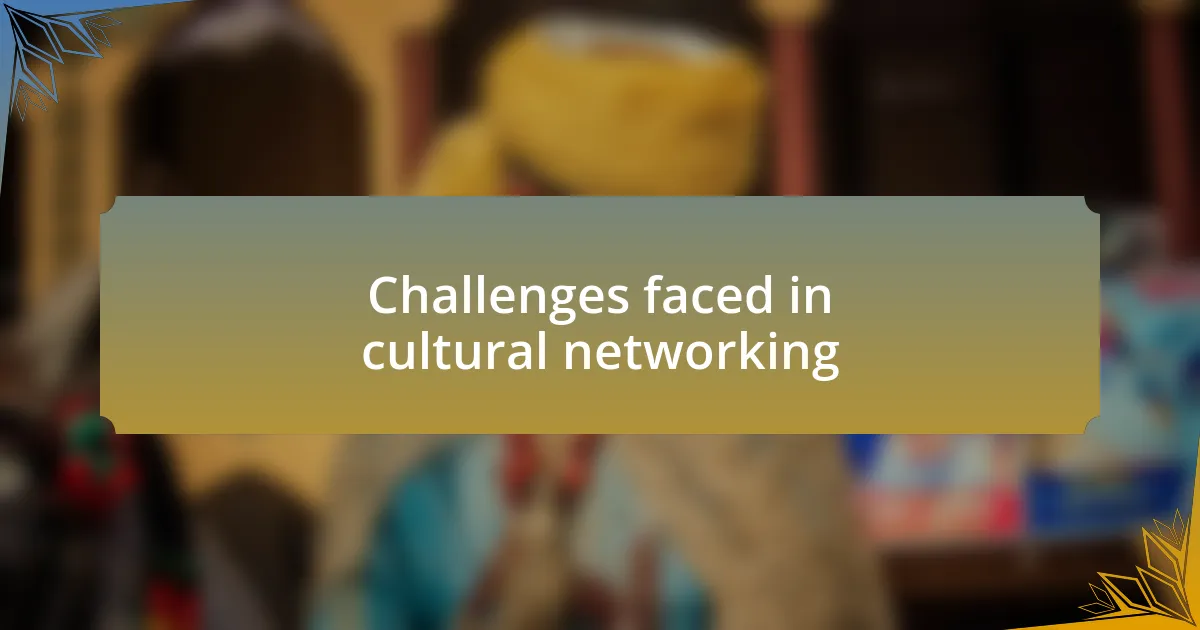
Challenges faced in cultural networking
Navigating cultural networking often brings its own set of challenges. While in Japan, for instance, I faced the intricacies of non-verbal communication. I recall attending a business meeting where everyone adhered to strict etiquette, leaving little room for overt expressions. Initially, I struggled to interpret subtle gestures and silence, which made it challenging to gauge reactions. Have you ever found yourself second-guessing your understanding in a different cultural context?
Another significant hurdle I encountered was the varying expectations around relationship-building. During my time in Brazil, I noticed that building trust took precedence over direct business discussions. I remember feeling the pressure of prolonged social interactions before even broaching work topics. It made me question whether I was investing enough time in personal connections. Does a more social approach lead to stronger professional ties? In my case, I eventually realized that patience really did pay off, deepening the connections I made.
Lastly, language barriers often transformed simple networking moments into complex puzzles. In France, I attended an event primarily conducted in French, despite my limited grasp of the language. I vividly recall the feeling of frustration when I couldn’t fully express my thoughts or engage in conversations. This experience taught me the importance of linguistic adaptation and the value of listening intently, even if I wasn’t fluent. Have you ever relied more on body language than words to communicate? Through this challenge, I learned that the essence of connecting transcends language, relying on genuine intent.
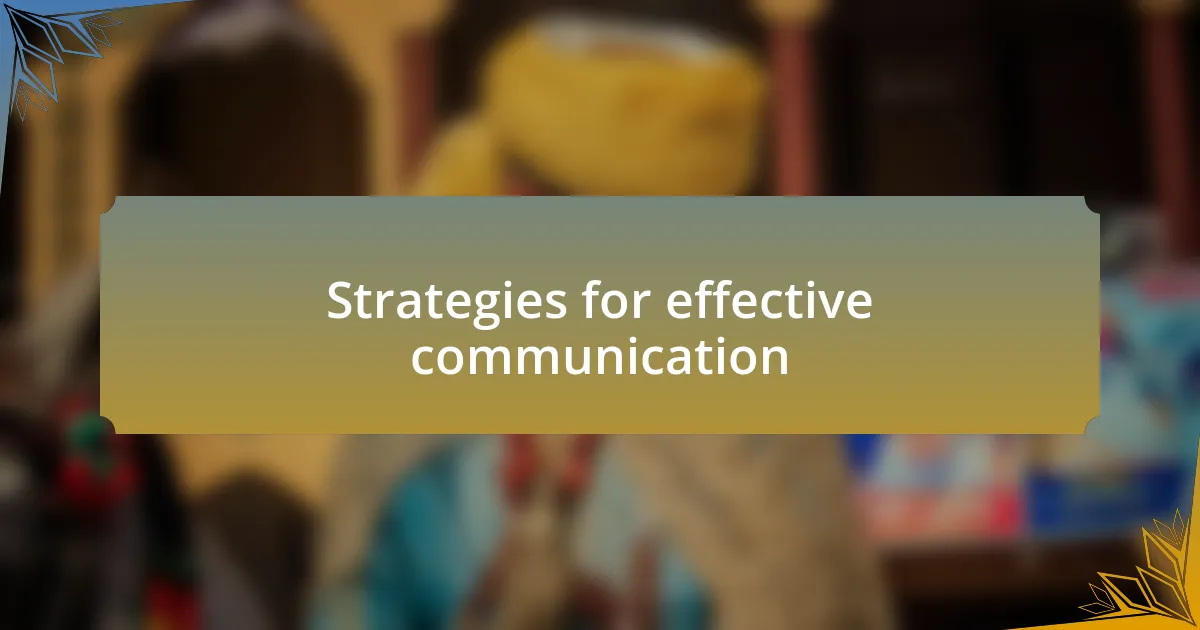
Strategies for effective communication
Effective communication in diverse cultural settings requires adaptability and keen observation. I remember a networking event in South Africa where directness was appreciated, but I had to balance it with local customs. As I initiated discussions, I found that greeting everyone individually and acknowledging their backgrounds built a bridge of respect and familiarity that facilitated open dialogue. Have you ever experienced a moment where a simple greeting made a big difference?
Another approach that proved invaluable was active listening. During a seminar in India, I took the time to truly listen to my counterparts rather than crafting my next statement while they spoke. This strategy allowed me to grasp nuances and respond thoughtfully, creating a flow of dialogue that felt more like a shared conversation than a standard exchange. I can’t stress enough how this shifted the tone of our interaction; it transformed potential barriers into opportunities for deeper engagement. How often do we underestimate the power of just listening?
Moreover, utilizing visuals and storytelling enhanced my communication in various cultural contexts. At a conference in Mexico, I observed how impactful visuals could convey meaning beyond language. For instance, I shared a success story through images and simple graphics, which resonated with the audience. This approach not only bridged language gaps but also created an emotional connection. Have you experimented with different communication tools to express your ideas? This flexibility can turn complex interactions into memorable experiences.
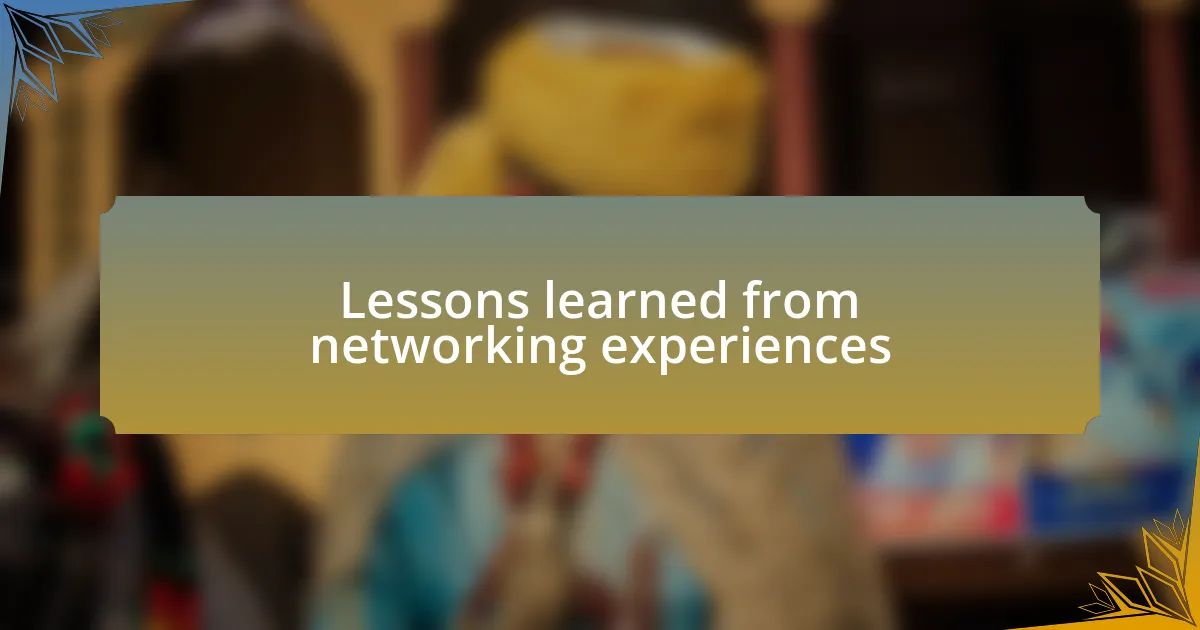
Lessons learned from networking experiences
Networking across different cultures can lead to unexpected lessons. At a recent conference in Japan, I learned that silence can be a powerful communication tool. During a discussion, there was a moment of quiet that felt uncomfortable to me, yet I soon realized that it was a cultural norm, allowing participants to reflect before responding. This experience taught me to embrace pauses rather than rush to fill them, showing respect for others’ thoughts.
Another key lesson emerged during my time in Brazil, where the warmth of interpersonal connections became apparent. I recall attending a casual meet-up where personal stories were shared before any formal business discussions took place. This approach demonstrated that building relationships often takes precedence over transactional interactions. Have you ever felt that a deeper connection enhanced a professional relationship? It certainly made me rethink the way I approach networking.
Lastly, I found that the context of interactions can significantly shape outcomes. While networking in Germany, I noticed that punctuality is not just about being on time; it reflects respect for others’ time. Arriving late risked diminishing my credibility. I learned that being culturally aware in these small yet impactful ways can set the stage for more meaningful exchanges. How often do we consider the little things that convey respect in networking?